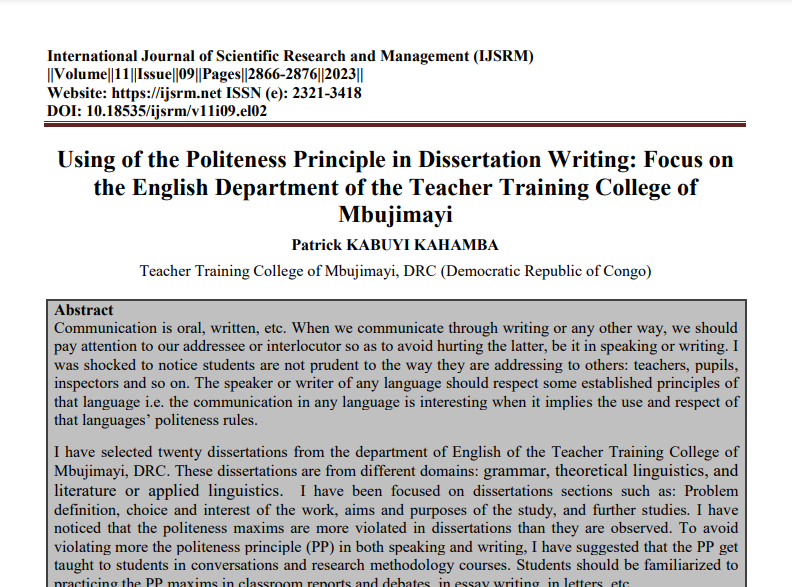Using of the Politeness Principle in Dissertation Writing: Focus on the English Department of the Teacher Training College of Mbujimayi

Submission to VIJ 2023-09-12
Copyright (c) 2023 Patrick KABUYI KAHAMBA

This work is licensed under a Creative Commons Attribution 4.0 International License.
Abstract
Communication is oral, written, etc. When we communicate through writing or any other way, we should pay attention to our addressee or interlocutor so as to avoid hurting the latter, be it in speaking or writing. I was shocked to notice students are not prudent to the way they are addressing to others: teachers, pupils, inspectors and so on. The speaker or writer of any language should respect some established principles of that language i.e. the communication in any language is interesting when it implies the use and respect of that languages’ politeness rules.
I have selected twenty dissertations from the department of English of the Teacher Training College of Mbujimayi, DRC. These dissertations are from different domains: grammar, theoretical linguistics, and literature or applied linguistics. I have been focused on dissertations sections such as: Problem definition, choice and interest of the work, aims and purposes of the study, and further studies. I have noticed that the politeness maxims are more violated in dissertations than they are observed. To avoid violating more the politeness principle (PP) in both speaking and writing, I have suggested that the PP get taught to students in conversations and research methodology courses. Students should be familiarized to practicing the PP maxims in classroom reports and debates, in essay writing, in letters, etc.
References
- Tshimanga, N.F.2016. “Theoretical Linguistics” First Undergraduate lecture note. Mbujimayi: English department.
- Halliday and Matthiessen.2014. Introduction to Functional Grammar. Routledge
- Hornby A.S. 2015.Oxford Advanced Learner’s Dictionary of Current English. Ninth edition. Oxford University Press Unpublished Third Undergraduate Dissertation.ISP:Mbujimayi.
- Puspita. A .2011. A Politeness Maxim Analysis on the Dialogue of “Date Night Movie”. A Thesis for the Degree of Strata1. Jakarta: State Islamic University Syarif Hidayatullah, English Letters Department Faculty of Adab and Humanities.
- Kalongo, J.P.2009. The Comparative Study of Politeness in English and Ciluba.Unpublished Third Undergraduate Dissertation. ISP:Mbujimayi.
- Villota, M.I .2013. The Cooperative, Relevance and Politeness Principles in Jokes: Interpretation and Complementariness. Trabajo Fin de Grado. Univerdad de La Rioja. Facultad de Letras y de la Educaciόn.
- Urbetová, A .2013..Aspects of Politeness in a Classroom of English as a Second Language. Diploma Thesis: Charles University in Prague Faculty of Education, Department of English Language and Literature
- Yaqubi, M at al.2016.Conversational Maxim View of Politeness: Focus on Politeness Implicatures Raised in Performing Persian Offers and Invitations. Theory and Practice in Language Studies, Vol. 6, No. 1, pp. 52-58, January 2016
- Grice, P.H. Logic and Conversation, reprinted from Syntax and semantics. Speech arts, Cole at al.“Logic and conversation”, pp 41-58. 1975. with permission from Elsevier.